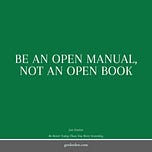Let’s start with some definitions:
Open Book: Typically means someone who readily shares everything about themselves without much discretion. It implies transparency to the point where there might not be filters or boundaries in what they share.
Open Manual: This implies being open to sharing information but with structure and purpose. Like a manual, it offers guidance and insight but is selective and thoughtful in what it reveals. It suggests that while you are open, you do so in a way that's strategic and deliberate, offering insights and information that are helpful and relevant.
In communication, being open and intentional can make all the difference. Think of yourself as an open manual: a reliable guide that others can trust for clarity and insight. Here’s why this approach can be highly effective:
Transparency Builds Trust: When you're open about your decisions, challenges, and successes, you build trust with others. People value honesty, and being transparent creates a foundation of authenticity in your relationships.
Intentional Communication Creates Focus: Just like a manual doesn't include unnecessary details, you should be selective about what you share. Being thoughtful ensures your message stays on point, aligning with your values and goals. This helps avoid distractions and keeps the conversation productive.
Adding Value Matters: Every section in a good manual is designed to help. Similarly, your communication should aim to add value—whether it’s sharing insights, solving problems, or inspiring action. This approach ensures your message resonates and leaves a lasting impact.
Aligning with Your Principles: Every piece of information you share should reflect your core principles. Consistency between what you say and what you believe reinforces your credibility and strengthens relationships over time.
Clarity Promotes Understanding: A well-written manual is easy to follow. When you communicate with clarity, you reduce misunderstandings, making sure your message is understood and appreciated.
Empowering Others: Just like a manual helps users navigate tasks, your words can empower others to grow and succeed. By sharing your experiences and expertise, you offer others the tools they need to thrive.
Continuous Improvement: Manuals are updated to stay relevant. In the same way, your communication should evolve. Being open to feedback allows you to continuously improve how you connect with others.
Being an open manual is about more than just transparency; it's about being purposeful and always adding value. When you communicate this way, you not only build trust but also create lasting, meaningful connections. So next time you engage with someone, think about how you can be clear, intentional, and always aligned with your principles—just like a well-crafted manual.
Why Being an "Open Book" Can Backfire as a Communication Strategy
We often hear people say, "I'm an open book," as if it's a badge of honor. While openness and transparency are valuable traits, being an unfiltered open book in communication can cause more harm than good. Here’s why sharing everything without boundaries can be a less effective way to connect with others.
Lack of Discretion Dilutes Your Message:
When you share everything, all at once, it becomes difficult for people to grasp what’s truly important. Think of it like a novel with no plot—too much irrelevant information can make it hard for others to know what’s worth paying attention to. Overloading others with every detail dilutes the impact of what you’re really trying to communicate.
Boundaries Are Necessary for Healthy Relationships:
While transparency builds trust, healthy boundaries are essential for maintaining respect. Being an open book means you might overshare, crossing personal or professional lines. This can make others uncomfortable or lead them to feel burdened by information they didn’t ask for. Boundaries help maintain a sense of professionalism and mutual respect.
Vulnerability Without Purpose Can Undermine Credibility:
Opening up and being vulnerable can be powerful—if done with intention. However, if you’re constantly airing personal issues or feelings without considering the context, it can make you appear emotionally unsteady. There’s a difference between sharing experiences that provide insight and dumping every thought or emotion onto others.
Oversharing Can Lead to Misunderstandings:
Not everyone will interpret your openness the way you intend. Sharing too much, too soon can lead to misunderstandings, assumptions, or even judgment. You might think you're being relatable, but others could see it as a lack of professionalism or self-awareness.
It Can Erode Professional Boundaries:
In work settings, being an open book can backfire. While it's good to have a rapport with colleagues, too much personal information can blur the lines between professional and personal relationships. This might lead to awkward situations or even make it harder for others to take you seriously.
Emotional Overload Burns Bridges:
Constantly sharing personal struggles, worries, or intimate details can lead to emotional overload for the people around you. Instead of fostering connection, it can push people away, as they might feel overwhelmed or ill-equipped to respond.
It Opens the Door to Misuse of Information:
Sharing every detail about yourself gives people information they may not need—or worse, could use against you. Not everyone will have your best interests at heart, and oversharing can sometimes leave you vulnerable to manipulation or gossip.
While honesty and openness are important traits, being an "open book" without filters or boundaries can harm your relationships, both personally and professionally.
Thoughtful communication requires knowing when to share and when to withhold, ensuring that what you say adds value and aligns with your purpose.
Next time you’re tempted to share everything, pause and ask yourself: Does this information help or hinder the conversation?
When you set boundaries and communicate with intention, you create space for meaningful connection without the risk of oversharing.













